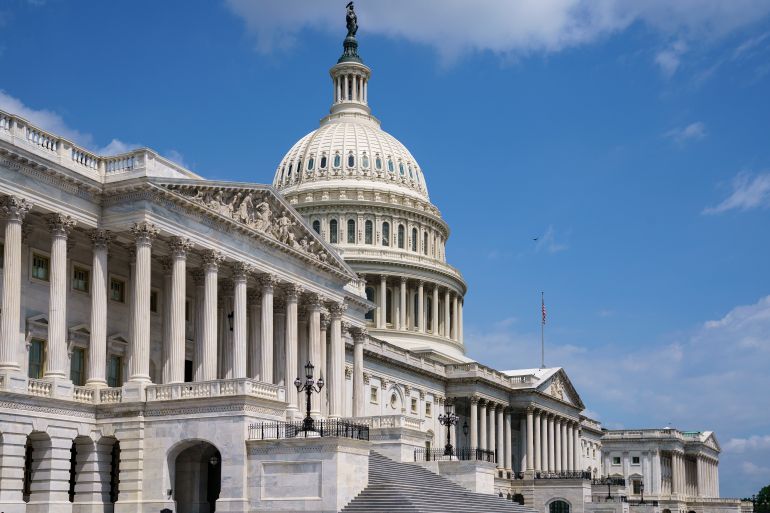US Senate overwhelmingly passes massive defence spending bill
Legislation, which still needs President Joe Biden’s final approval, authorises $777bn in United States defence spending.

The United States Senate has passed a $777bn defence spending bill, sending the legislation to the desk of President Joe Biden for final approval.
The evenly-divided Senate approved the legislation – formally known as the National Defense Authorization Act (NDAA) – on Wednesday in an 88-11 vote, garnering strong support from both Democrats and Republicans. The House of Representatives passed it by 363-70 last week.
Keep reading
list of 4 itemsUS defence chief pledges to counter Iran during Bahrain visit
US defence secretary condemns China hypersonic missile tests
Saudi pleads with US for missile defence resupply: Report
Biden is expected to sign the bill, which authorises $25bn more than the US president requested, but the White House did not immediately respond to requests for comment from the Reuters news agency on its passage on Wednesday.
The NDAA is closely watched by a broad swath of industry and other interests because it is one of the only major pieces of legislation that becomes law every year and because it addresses a wide range of issues.
Most of the funds approved in this year’s bill – $740bn – are going to the Pentagon, while another $27bn is for the Department of Energy. The legislation also authorises $9.9bn for defence needs outside the legislation’s traditional jurisdiction, bringing the total to $777bn.
The Democratic chairman and ranking Republican on the Senate Armed Services Committee, Senators Jack Reed and James Inhofe, issued a joint statement praising the bill’s passage as a rare moment of comity in the divided Congress.
“This bill sends a clear message to our allies — that the United States remains a reliable, credible partner – and to our adversaries – that the U.S. military is prepared and fully able to defend our interests around the world,” Inhofe said.
But rights groups and progressive US lawmakers have questioned the massive price tag of the NDAA, arguing that the money could be better spent on social programmes and other needs of Americans.
“We ended the longest war in US history, yet Congress just passed a $768 BILLION defense budget — more than the military budgets of the next 11 countries combined,” Pramila Jayapal, chair of the Congressional Progressive Caucus, wrote on Twitter on Wednesday, referring to the US’s 20-year war in Afghanistan, which ended in August.
“Don’t tell me we can’t afford to fight poverty, cancel student debt, pass paid leave, and defeat the climate crisis.”
Disputes over China, Russia
The annual bill, which has passed the House of Representatives and the Senate every year for decades without fail, was delayed in the Senate this year by various disputes over China and Russia policy.
Among its many provisions, the legislation includes a 2.7 percent pay increase for the troops, and more aircraft and navy ship purchases, in addition to strategies for dealing with geopolitical threats.
The NDAA includes $300m for the Ukraine Security Assistance Initiative, which provides support to Ukraine’s armed forces, $4bn for the European Defense Initiative and $150m for Baltic security cooperation.
On China, the bill includes $7.1bn for the Pacific Deterrence Initiative and a statement of congressional support for the defence of Taiwan, a democratically-ruled island that Beijing claims as its own territory. It also includes a ban on the Department of Defense procuring products produced with forced labour in China’s western Xinjiang region.
We ended the longest war in US history, yet Congress just passed a $768 BILLION defense budget — more than the military budgets of the next 11 countries combined.
Don't tell me we can't afford to fight poverty, cancel student debt, pass paid leave, and defeat the climate crisis.
— Pramila Jayapal (@PramilaJayapal) December 15, 2021
The US has accused China of committing “genocide” in its treatment of Uighur Muslims in Xinjiang, heightening tensions between the two nations.
China rejects international criticism and sanctions over the situation in Xinjiang, despite the United Nations and rights groups saying at least one million Uighurs and members of other mostly Muslim minorities have been detained.
Domestically, the NDAA also includes an overhaul of the US military justice system to take decisions on whether to prosecute cases of rape, sexual assault and some other major crimes out of the hands of military commanders.
The change was a partial victory for activists because it did not strip military commanders of the authority to prosecute all felonies. It came after advocates led by Democratic Senator Kirsten Gillibrand waged a years-long effort to change the system in response to the thousands of cases of sexual assault among service members, many of which are never prosecuted.
The legislation also sets up a commission to assess the failures of the US’s 20-year war in Afghanistan following the Taliban’s takeover of the country in August. The last US troops left the country at the end of that month.
The Commission on Afghanistan will include 16 members appointed by the two major parties and was given a deadline to issue an initial report within a year of its first meeting, and a final report within three years.
“The Commission shall conduct a comprehensive assessment of the war in Afghanistan and make recommendations to inform future operations with tactical and strategic lessons learned, including the impact of troop increases and decreases and date-certain deadlines,” the legislation said.